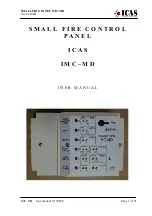
31
Powered output circuits are supervised while they are not active for both open circuits and
shorts.
The circuit will not be activated if there is a short trouble on the circuit. It will be activated if an
open trouble is indicated. A circuit trouble activates the common trouble sequence as a non-
latching trouble. Since open circuit supervision does not operate while the circuit is in alarm, if
the circuit was in trouble before it was activated, it will still indicate trouble while active. The
trouble condition will be re-evaluated when supervision resumes.
Output circuits configured as strobes can have sync protocol for synchronization if configured.
Certain strobe and strobe/horns models of the following brands are supported:
•
Mircom
•
System Sensor
•
Wheelock
•
Gentex
When configured as normal, the output circuit is ON continuously when activated and does not
use any sync protocol. When configured as non-silenceable strobes, the strobes cannot be
silenced, but the horn can be silenced by pressing the 'signal silence' button.
If the strobe is configured as silenceable strobe both the horn and the strobe are silenced
(stopped) by pressing the 'signal silence' button.
5.5
Single Stage Operation
In a single stage system, all alarm inputs are treated in a similar manner. Alarm inputs include
any of the following:
•
Non-verified alarm
•
Verified alarm
•
Waterflow alarm
•
Sprinkler alarm
Any of the above alarm inputs activating when the panel is not already in alarm cause the
following:
•
The buzzer sounds steady.
•
Cancels active fire drill.
•
Common Alarm LED turns ON.
•
Common Alarm relay activates if Aux disconnect is not active.
•
The Auto Signal Silence timer activates (if configured).
•
The Signal Silence Inhibit timer activates (if configured).
•
If Aux disconnect is not active, activates all non-disconnected indicating circuits
programmed to the input.
•
Activates non-disconnected strobes associated with the input.
•
Activates non-disconnected signals associated with the input at the evacuation rate.
Subsequent alarms when the panel is already in alarm, cause the following:
















































